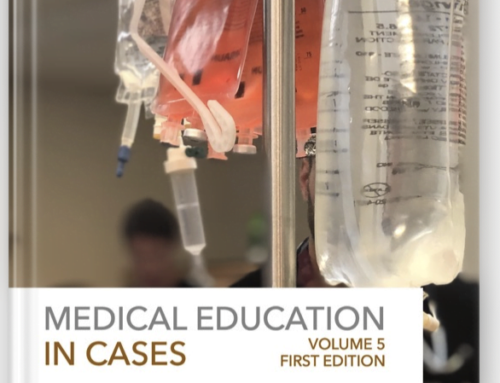 Welcome to season 3, episode 4 of the ALiEM Medical Education in Cases (MEdIC) series! Our team (Brent Thoma, Sarah Luckett-Gatopoulos, Tamara McColl, Eve Purdy, and Teresa Chan) is pleased to welcome you to our online community of practice where we discuss difficult medical education cases each month. As usual, the community discussion will be reviewed using qualitative research methods to produce a curated summary that will be combined with two expert responses to create a functional teaching resource.
Welcome to season 3, episode 4 of the ALiEM Medical Education in Cases (MEdIC) series! Our team (Brent Thoma, Sarah Luckett-Gatopoulos, Tamara McColl, Eve Purdy, and Teresa Chan) is pleased to welcome you to our online community of practice where we discuss difficult medical education cases each month. As usual, the community discussion will be reviewed using qualitative research methods to produce a curated summary that will be combined with two expert responses to create a functional teaching resource.
This month’s case features a couple of colleagues who are trying how to evaluate a medical student appropriate. How can we give critical feedback in a busy emergency department? What is our obligation as physicians in terms of reporting negative feedback to our institutions? Should learners who are uninterested in emergency medicine be held to a different standard? Please read the case and join in the discussion below!
[su_spoiler title=”MEdIC Series: The Concept” style=”fancy” icon=”caret”]Inspired by the Harvard Business Review Cases and initially led by Dr. Teresa Chan (@TChanMD) and Dr. Brent Thoma (@Brent_Thoma), the Medical Education In Cases (MEdIC) series puts difficult medical education cases under a microscope. On the fourth Friday of the month, we pose a challenging hypothetical dilemma, moderate a discussion on potential approaches, and recruit medical education experts to provide “Gold Standard” responses. Cases and responses are be made available for download in PDF format – feel free to use them! If you’re a medical educator with a pedagogical problem, we want to get you a MEdIC. Send us your most difficult dilemmas (guidelines) and help the rest of us bring our teaching to the next level.[/su_spoiler]
MEdIC: The Case of the Awkward Assessors
by Dr. Eddie Garcia
“Hey, Tom, crazy day, no?”
Tom looked up from the computer screen. A fourth-year medical student, Patrick, had a grin plastered on his face. He repeated himself, “Crazy, huh?”
“Yeah, crazy day, definitely.” Tom turned back to computer to catch up on charting. “So you learn anything today?”
“Of course! I saw a traction pin being placed and looked at so many x-rays!” Patrick couldn’t hide his enthusiasm. “So, how did I do today?”
Tom hesitated for a second. He didn’t know exactly how to respond to Patrick. After doing an I&D together at the start of the shift, Tom hadn’t seen Patrick for most of the day. Maybe they had just missed each other in the chaos, but Tom didn’t think so. Was it possible that Patrick hadn’t been in the department that day?
Tom considered probing further, but he was tired. He gave the easy response, “You’re doing a good job. You did great with that I&D. Keep it up.”
“Fantastic! Listen, I need an assessment form filled out by an attending. Do you think you could tell Dr. Pam that I did a good job? I only have one more shift and I really need to get one before I’m done. Thanks.”
*******
Tom stretched and signed his last note. He was about to head out when Dr. Pam sat down at the computer next to him. Tom remembered Patrick’s request.
“Hey, Dr. Pam, you know that MS4, Patrick? He told me he asked you for an assessment form. I thought I’d pass along that he did a pretty good job on an I&D in the morning.”
“Oh, did he?” replied Dr. Pam. “That’s great. What other patients did you see together?”
Tom sensed a funny tone in Dr. Pam’s voice. He weighed his words carefully, “Well, none that I can remember, but it was pretty busy.”
“That’s because he spent most of the day parading around with various surgical services,” said Dr. Pam matter-of-factly. “I’ve worked with him before and that seems to be his usual. Yesterday, he spent half the day tailing ortho because his first patient had a fracture.”
“But, hey, I get it,” continued Dr. Pam. “Emergency medicine isn’t for everyone. Let him go where his interests lead him. As for his eval, I’ll probably just leave it blank. I’d rather do that than give him a real assessment. After all, he seems nice enough.”
“Makes sense, although he did say he really needed . . .” Tom trailed off.
Patrick stood silently in the doorway, assessment form in hand.
Dr. Pam was cool and collected. “Hey there, Patrick. Why don’t you sit down with us? We were just talking about you. Let’s discuss that assessment form.”
If you were Dr. Pam, how would you handle this situation? (More questions for discussion follow)
Discussion Questions
- With close quarters and constant traffic, the emergency department is a high-risk zone for eavesdropped conversations. However, as physicians, we are supposed to be experts at keeping conversations private! Considering the often large number of collaborative assessments and verbal feedback sessions required in the academic setting, how can we keep private conversations private?
- Tom gives the “easy response” to Patrick when asked for feedback. If feedback were part of the oral boards, what would be the critical fails?
- Patrick is not interested in emergency medicine. How do you approach assessing students going into emergency medicine versus those going into other fields?*
*Author’s note: The question refers to assessing students in general and not students specifically in Patrick’s situation.
Weekly Wrap Up
As always, we will post the expert responses and a curated commentary derived from the community responses one week after the case was published. This time the two experts are:
- Dr. Inna Leybell is an Assistant EM Residency Program Director at NYU / Bellevue Medical Centers.
- Dr. Karen Hauer is Associate Dean for Assessment and Professor of Medicine at the UCSF School of Medicine.
On January 29, 2015 we posted the Expert Responses and Curated Community Commentary for the Case of the Awkward Assessors. After that date, you may continue to comment below, but your commentary will no longer be integrated into the curated commentary. That said, we’d love to hear from you, so please comment below!
All characters in this case are fictitious. Any resemblance to real persons, living or dead, is purely coincidental. Also, as always, we will generate a curated community commentary based on your participation below and on Twitter. We will try to attribute names, but if you choose to comment anonymously, you will be referred to as your pseudonym in our writing.




